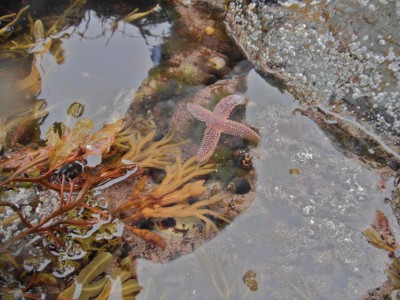A wolf can scare many more elk than it can eat, and thus non-consumptive effects of predators on their prey can often impact ecological communities as much or more than actual consumption. To fully understand how trophic dynamics shape communities, biological interactions must be considered in conjunction with physical factors, which also influence prey behavior and physiology. In their recent publication, MSC postdoctoral researcher Catherine Matassa, and Director Geoff Trussell explore non-consumptive predator-prey interactions in rocky intertidal communities, with a particular emphasis on how they might be impacted by rising ocean temperatures.
In the study, appearing in the journal Oecologia, Matassa and Trussell examine how non-consumptive predator-prey interactions change along a temperature gradient by comparing the effects of predatory crabs on prey snails at 3 locations throughout the Gulf of Maine. Risk cues from invasive predatory green crabs caused large reductions in snail foraging, growth, and growth efficiency at all three sites even though snails transplanted to the warmer southern end of the gulf ate and grew twice as much as those transplanted to the colder northern gulf. In fact, even when exposed to high predation risk, the positive effects of warmer temperatures allowed snails in the south and under high predation risk to perform better than snails in the north exposed to low predation risk.
These results indicate that snails in the central and northern Gulf of Maine are likely living below their optimal temperature. As a result, warmer temperatures have positive effects on snail foraging and growth. This research suggests that northern snails may benefit from future ocean warming as a way to offset the negative impacts of increased predation risk, which is likely to occur because warming ocean temperatures are promoting the expansion of the green crab’s range in the Gulf of Maine. This study highlights how considering the effects of temperature on species interactions can improve predictions of the impacts of climate change on ecological communities.

